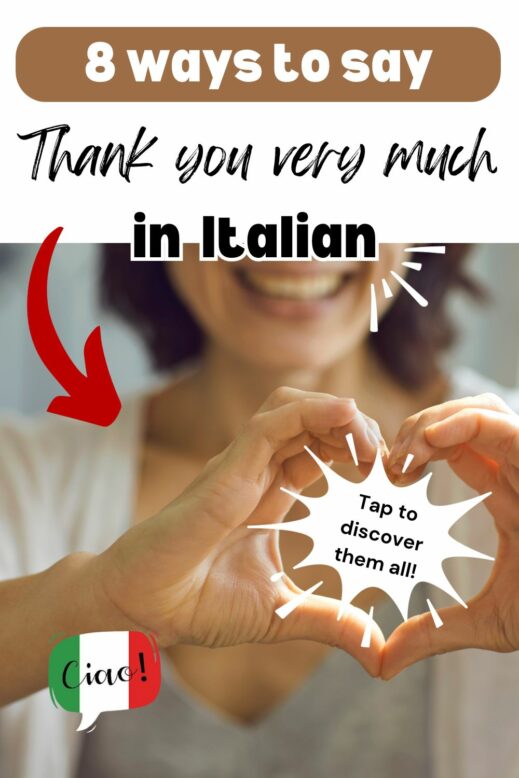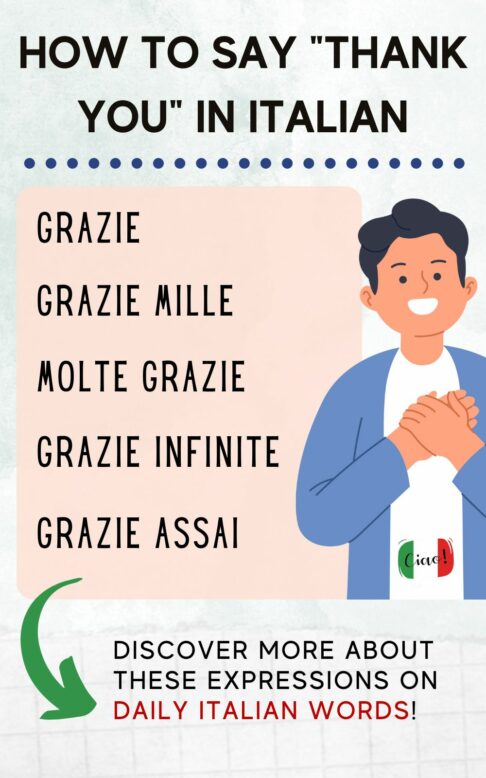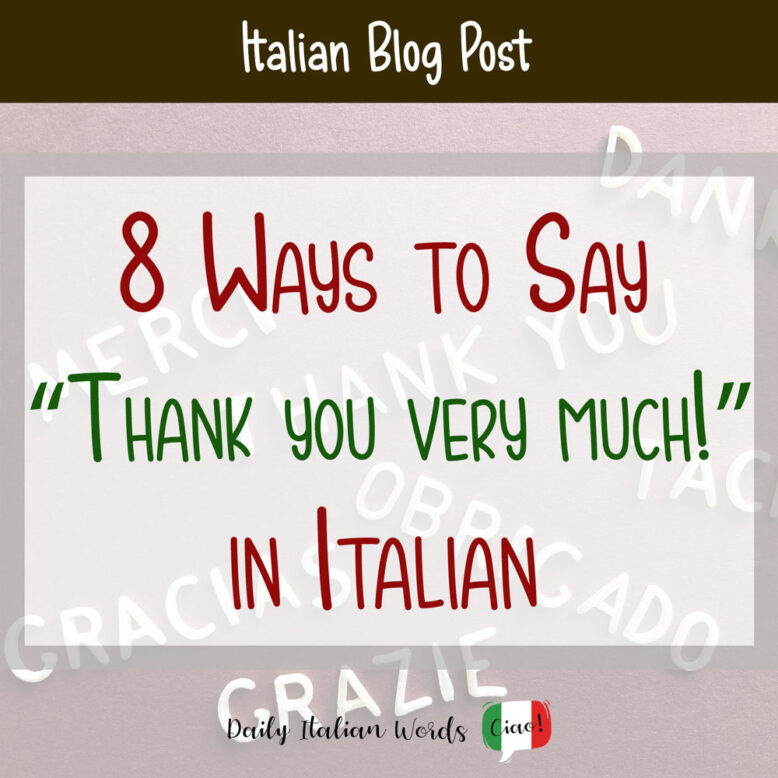Most people, regardless of whether or not they are studying the language of love, know that the word for thank you or thanks in Italian is grazie.
However something of which they may not be aware is that there are eight (yes, eight!) different ways of translating thank you very much. Let’s take a look at them now!

1. Grazie mille
Grazie mille, which means one-thousand thanks, is by far the most common way of saying thank you very much in Italian. In fact, I would say it’s the one my husband and I use 95% of the time.
Grazie mille per il vino. Era buonissimo!
Thank you very much for the wine. It was delicious!
You can swap the position of grazie and mille to create the expression mille grazie but you won’t hear it as often as grazie mille.

Note: If said with a sarcastic or irritated tone, the phrase can convey annoyance rather than thanks. For example:
A: Ho comprato un biglietto per il concerto di Zucchero.
I bought a ticket for the Zucchero concert.
B: E non ne hai preso uno anche per me? Grazie mille eh, che gentile che sei!
And you didn’t get me one? Thanks a lot, eh, you’re so kind!
2. Molte grazie
Molte grazie is the second most popular translation for thank you very much that you’ll encounter while living in Italy. Literally translating as many thanks, it is a little less emphatic than grazie mille and is used during informal exchanges.
Molte grazie per la bella serata.
Thank you very much / Many thanks for the lovely evening.
Like grazie mille, you can switch the order around to create grazie molte.
3. Tante grazie
An expression of thanks that is more or less identical to molte grazie is tante grazie, which makes sense since molto and tanto are synonyms that mean a lot / many.
Tante grazie per la tua lettera!
Thank you very much for your letter!

Tante grazie ≠ grazie tante!
Be careful if you invert these two words. Whereas tante grazie is used to express gratitude towards someone, grazie tante is used with a sarcastic or ironic tone to say the opposite, a bit like Thank you for nothing! or Thanks a lot! using a sarcastic intonation.
4. Grazie infinite
A flowery expression no learner should ignore is grazie infinite (or infinite grazie). Literally translating as infinite thanks, it comes in handy when a simple grazie isn’t enough to express your gratitude. I’d generally avoid using it in casual conversation with close friends and family however, as it can sound a bit over the top!
Grazie infinite per l’ottima cena!
Thank you very much for the excellent dinner!
5. Grazie assai
Grazie assai is an expression used primarily in the southern regions of Italy such as Sicily and Campania. Assai can mean either enough or very depending on the context.
Grazie assai per la torta. Era squisita!
Thank you very much for the cake. It was delicious!

6. Grazie davvero
The phrase grazie davvero is similar to the expression thanks, I really mean it in English. Italians frequently use this phrase when they want to sound particularly sincere. You can even double the grazie to make it more powerful.
Grazie, grazie davvero per il tuo aiuto!
Seriously, thank you, thank you so much for your help!
You can also move davvero to the end of the sentence to emphasise your gratitude even more.
Grazie per il tuo aiuto, davvero!
Thank you so much for your help, for real!
7. Grazie di cuore
Grazie di cuore is the equivalent of a heartfelt thanks in English. Like grazie infinite, it too can sound a little excessive, so I’d suggest reserving it for situations where a genuine thank you is truly called for.
Grazie di cuore per tutto quello che hai fatto per me.
Thank you very much for everything you’ve done for me.
8. Ti / La / Vi ringrazio tanto
Another way of saying thank you in Italian is to use the verb ringraziare (to thank) and include the direct pronoun to specify who is on the receiving end of the thank you:
- ti ringrazio (informal) = I thank you (friend, sister)
- La ringrazio (formal) = I thank you (policeman, boss)
- vi ringrazio (plural) = I thank you (friends, colleagues)
To transform the phrase into something that matches thank you very much, simply add the adverbs tanto or molto (a lot) onto the end.
La ringrazio molto per il suo tempo, signor giudice.
Thank you very much for your time, Your Honour.

There are of course additional ways to express gratitude in Italian. You can learn more about them by visiting our dedicated article about grazie.


Heather Broster is a graduate with honours in linguistics from the University of Western Ontario. She is an aspiring polyglot, proficient in English and Italian, as well as Japanese, Welsh, and French to varying degrees of fluency. Originally from Toronto, Heather has resided in various countries, notably Italy for a period of six years. Her primary focus lies in the fields of language acquisition, education, and bilingual instruction.


